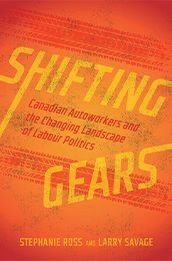
Stephanie Ross and Larry Savage
UBC Press, 2024; 356 pp
By Susan Spronk
Labour unions are not only economic actors but also political protagonists. Historically, in Canada and other countries, labour unions have maintained a close (and sometimes official) relationship with specific left-leaning political parties that shared a common ideology, like the New Democratic Party (NDP).
However, as these political identities have weakened, the links between labour movements and parties have also weakened. This is because social democratic parties have either willingly or unwillingly implemented pro-market, anti-labour policies that are diametrically opposed to the interests of workers.
Stephanie Ross and Larry Savage’s book, Shifting Gears, explores these dynamics in the Canadian labour movement by focusing on autoworkers. While it may be tempting to think that a book about autoworkers has little relevance for academic staff associations, there are lessons here for all of us. After all, the choices made by the governing parties at both federal and provincial levels affect everyone working in a higher education institution.
Organized into eight chapters, Shifting Gears traces the origins of the Canadian Auto Workers (CAW), which broke away from its American affiliate in the early 1980s and then merged with the Communications Energy and Paperworkers to create Unifor in 2013. Today, Unifor is Canada’s largest private sector union.
The narrative revolves around the interplay between two ideological tendencies that have influenced the choices of leaders: business unionism, which narrowly concentrates on the bread-and-butter issues confronting the bargaining unit members, and social unionism, encompassing both involvement in social justice struggles beyond the workplace and union activity beyond the collective bargaining process.
CAW/Unifor represents a complex synthesis of these two tendencies, but as Ross and Savage explain, the union’s political strategy has shifted from the 1960s to the 1990s. The CAW “saw politics as class-based,” which led it to forge a partisan relationship with the NDP. While its successor’s commitment to social unionism remains intact, its political strategies shifted significantly in the face of a crisis in social democratic electoralism in the 1990s and the rise of neoliberalism.
Most recently, in the face of an unprecedented attack on union rights and freedoms, significant industrial job losses, and de-unionization, a defensive and transactional labour politics rooted in sectionalism — the tendency of unions to limit their aims and objectives for the benefit of their dues-paying members — became more prominent in Unifor.
The political intrigue and chicanery of some of this internecine politics may only captivate Canadian labour history nerds, but the spectacular fall of former Unifor president Jerry Dias and the election of Lana Payne has the quality of a good political drama you would find on your favourite streaming service.
Ross and Savage’s book also has lessons for the broader labour movement, including academic staff associations. What does it look like when an academic staff association decides to engage in formal politics? Is once-a-year lobbying enough, or do we need to build power by forging more organic relationships between our members and political parties through member education and organizing for elections? If so, which party (or parties) at the federal and provincial levels?
Since our core value of academic freedom depends on preserving institutional autonomy, academic staff associations are unlikely to seek formal ties with political parties. But as the working conditions of academic staff across the country continue to deteriorate in the context of budget austerity, provincial mandates that threaten academic freedom, and the hiring of precarious contract academic staff, we may find ourselves asking these questions more frequently.
In terms of which party to line up with, Ross and Savage cannot ultimately answer that question, but what they make clear is that focusing narrowly on short-term public policy gains by engaging in merely transactional politics is a dead-end strategy that leads to resentment and disunity among the working class. Instead, unions need a longer-term political vision that prioritizes broader working-class interests, which in our case includes fighting for the accessible, affordable, and quality higher education that our students and societies more broadly deserve.
Susan Spronk is an associate professor in the School of International Development and Global Studies at the University of Ottawa.